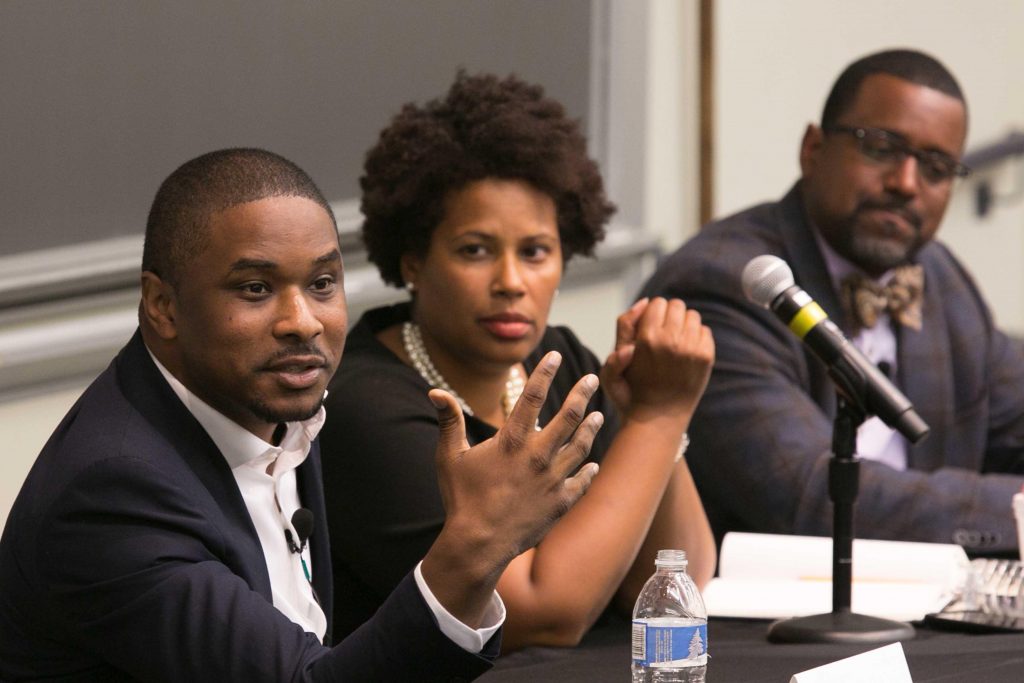The past, present, and future collided at the Race and Public Policy panel hosted by the Rappaport Center for Law and Public Policy on September 11. The event focused on the intersection of race and public policy, examined how the nation arrived at this moment of racial inequity and injustice, and explored how to shape a better future.
The panel kicked off the Rappaport Center’s fifth year at Boston College Law School. The discussion was led by Tanisha Sullivan ’02, president of the Boston branch of the NAACP.
Sullivan argued that policy can affect racism in two ways: by cementing racist ideas or disrupting systemic racism. She also explained the role of policymakers involved in processes that bolster the latter. “Thoughtful policymakers take the time to understand the impact of policy on all people and seek to mitigate the adverse impact of public policy to the greatest extent possible for those who are most marginalized,” Sullivan said.
Rahsaan Hall, above right, director of the Racial Justice Program for the ACLU of Massachusetts, introduced the importance of electing those who will advocate for racial minorities and noted the challenges that come with the election process. “There is a constant struggle that advocates, and people of color, in particular, are up against where there are these repressive movements to alter voting districts and to impose barriers to voting rights,” Hall said. “The lack of representation that people of color have in this country is directly tied to this history of racism.”
Without representation, imperative conversations on the implications of policy decisions, regardless of their intention on race, might not happen, he added. “There have been well-intentioned policies, compromised policies, bad policies,” Hall explained. “Within most of those, there has been an absence of meaningful conversations about race. If we are not talking about race, even in these race-neutral provisions of law and policy, we are doing a significant disservice and we are further cementing these impediments and barriers to people’s ability to thrive.”
Brandon Terry, above left, an assistant professor of African and African American Studies and Social Studies at Harvard University, agreed that the process of policymaking can potentially lead to the spread of racism. He introduced a sort of guide to all inquiry into public policy which included intensively studying our history to understand the causes of the injustices that we see, becoming attuned to and critical of established racial ideologies in society, and constantly questioning normative principles and values while taking part in the policymaking process.
The panel further addressed whether race should be a factor in public policy solutions, and how legal strategies that directly aim to tackle issues of systemic racism, like reparation, can exist in our country.
Hall questioned how policy involving race to solve issues of racial injustice could pass constitutional scrutiny, saying he did not think there would be a lineup on the Supreme Court that would find it acceptable. He argued that while solutions emerge from being intentional about race in policymaking, additional problems, like this, also arise.
Terry raised the idea of a long-term vision to radically rebuild the structures of jurisprudence to allow direct involvement of race in public policy solutions. He said that the current liberal shift of racial attitudes in young people was enough to give him confidence in a future that might allow race as a factor in creating public policy.
“There is a lot to be dispirited about right now,” Terry said, “but there is also a lot to take hope in as we look to long-term restructuring of the foundations of this society.”
Ultimately, all three panelists agreed that deep legal thinking, long-term strategy, and the current motivation for systemic change are all necessary to transform the architecture of oppression.
“I think that there is an opportunity in this moment,” Sullivan said, “because of the social and political climate, for us to challenge current legal thinking in a way that actually might get us closer to systemic change on these racial issues.”


